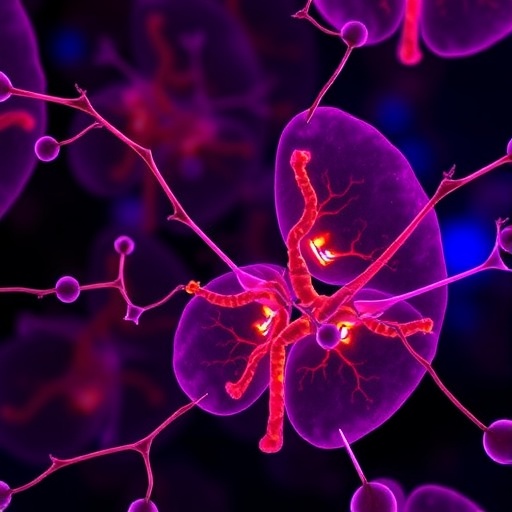In a groundbreaking study published in Nature Communications, researchers have uncovered a pivotal molecular mechanism that drives metastasis in pancreatic cancer, one of the most lethal malignancies known for its aggressive progression and poor prognosis. The investigation centers on the role of STN1, a lesser-known component of the CST (CTC1-STN1-TEN1) complex, and its influence on the transcription of ZEB1, a master regulator of the epithelial-mesenchymal transition (EMT), a critical process implicated in cancer metastasis. This novel finding adds a significant piece to the complex puzzle of pancreatic tumor dissemination and opens potential avenues for therapeutic intervention.
Pancreatic cancer remains notorious for its high mortality rate, largely due to its propensity for early metastasis and resistance to conventional therapies. While the genetic drivers of pancreatic ductal adenocarcinoma (PDAC) have been extensively studied, the intricate molecular machinery underpinning metastasis remains inadequately understood. EMT, the process by which epithelial tumor cells acquire a mesenchymal phenotype, equips these cells with enhanced motility and invasiveness, facilitating their escape from the primary tumor site. Among EMT regulators, ZEB1 stands out as a critical transcription factor orchestrating this phenotypic transformation.
The study puts forward compelling evidence that STN1 plays a facilitating role in the metastatic cascade by acting as a transcriptional activator of ZEB1. Traditionally recognized for its role in telomere maintenance and genome stability as part of the CST complex, STN1’s involvement in transcriptional regulation represents a paradigm shift. Through a series of meticulously designed molecular and cellular experiments, the authors demonstrate that elevated STN1 levels correlate with increased ZEB1 expression, thus promoting EMT and consequently enhancing metastatic potential.
.adsslot_djQXCuxUGA{ width:728px !important; height:90px !important; }
@media (max-width:1199px) { .adsslot_djQXCuxUGA{ width:468px !important; height:60px !important; } }
@media (max-width:767px) { .adsslot_djQXCuxUGA{ width:320px !important; height:50px !important; } }
ADVERTISEMENT
At the heart of this discovery is the demonstration that STN1 directly influences the transcriptional machinery at the ZEB1 promoter. Chromatin immunoprecipitation assays reveal the enrichment of STN1 at specific loci within the ZEB1 gene regulatory regions, suggesting a direct regulatory role. This challenges the traditional view of STN1 exclusively as a structural telomere-binding protein and hints at broader nuclear functions, including modulation of gene expression patterns critical for cancer progression.
Further validation in pancreatic cancer cell lines elucidates that manipulating STN1 expression markedly alters ZEB1 levels. Knockdown of STN1 results in a concomitant decrease in ZEB1 transcription, reversing EMT-associated phenotypes and dampening cell migratory abilities. Conversely, overexpression of STN1 intensifies EMT marker expression and enhances the invasive behavior of cancer cells. These findings robustly establish a causal link between STN1 activity and metastatic traits driven by EMT.
Importantly, the functional assays extend to in vivo models where STN1 modulation impacts tumor spread. Murine xenograft experiments highlight that STN1 depletion hampers metastatic colonization in distant organs, reaffirming the clinical relevance of this pathway. This underscores the potential for STN1 to serve not only as a biomarker for aggressive pancreatic cancer but also as a target for therapeutic strategies aimed at mitigating metastasis.
Mechanistically, the study posits that STN1 may interact with transcriptional co-factors or chromatin remodelers, thereby facilitating an open chromatin state at the ZEB1 promoter conducive to active transcription. Although the precise molecular partners of STN1 in transcriptional regulation remain to be fully elucidated, the identification of this novel function invites a re-examination of CST complex components beyond their canonical roles.
The implications of this research extend beyond pancreatic cancer, as the CST complex and EMT regulators are conserved across various cancer types. Researchers speculate that STN1-mediated transcriptional activation of EMT drivers might be a broader mechanism contributing to tumor aggressiveness in multiple malignancies, thereby broadening the potential impact of future therapies targeting this pathway.
Moreover, this study shines a light on the complex interplay between genome stability maintenance proteins and transcriptional dynamics in cancer biology. The dual functionality of STN1 in maintaining chromosomal integrity and promoting oncogenic transcription programs exemplifies the multifaceted roles proteins can adopt in cancer cells, adapting to facilitate survival and invasion.
The clinical translation of these findings could revolutionize therapeutic approaches. Targeting STN1 or its interactions with the transcriptional apparatus might inhibit ZEB1 expression and EMT progression, thereby stalling metastatic dissemination. Such targeted interventions could enhance the efficacy of existing treatments and improve the dismal survival rates associated with pancreatic cancer.
The research also prompts a revisitation of past genomic and transcriptomic datasets from pancreatic tumors to assess the prognostic value of STN1 expression. Integrating these data with clinical outcomes could establish STN1 as a predictive marker for metastasis, enabling more precise patient stratification and personalized treatment regimens.
While the study elucidates key aspects of STN1’s role in pancreatic cancer metastasis, several questions remain open. Future research is needed to dissect the full spectrum of molecular interactions involving STN1 in the transcriptional regulation landscape and to explore potential crosstalk with other pathways governing EMT and metastasis.
In conclusion, this landmark study exposes STN1 as a novel pro-metastatic factor in pancreatic cancer by fostering ZEB1 transcription and subsequent EMT. It challenges existing dogma surrounding telomere-associated proteins and presents a promising target for intervening in the metastatic cascade. As the fight against pancreatic cancer continues, unveiling such molecular underpinnings offers hope for developing therapies that can ultimately curb metastasis and improve patient outcomes.
Subject of Research:
The role of STN1 in promoting metastasis through transcriptional activation of the EMT regulator ZEB1 in pancreatic cancer.
Article Title:
STN1 facilitates metastasis by promoting transcription of EMT-activator ZEB1 in pancreatic cancer.
Article References:
Dong, D., Zhou, Z., Zhu, M. et al. STN1 facilitates metastasis by promoting transcription of EMT-activator ZEB1 in pancreatic cancer. Nat Commun 16, 7815 (2025). https://doi.org/10.1038/s41467-025-63083-0
Image Credits:
AI Generated
Tags: aggressive pancreatic tumorscancer cell invasivenessCST complex in cancerearly metastasis in cancerepithelial-mesenchymal transitionmolecular mechanisms of metastasisnovel findings in cancer researchpancreatic cancer metastasisPDAC genetic driversSTN1 in pancreatic cancertherapeutic targets for pancreatic cancerZEB1 transcription factor





